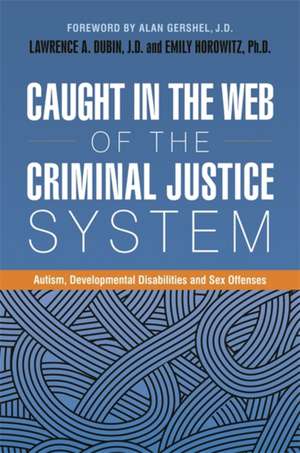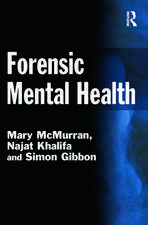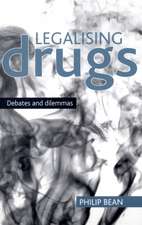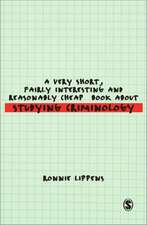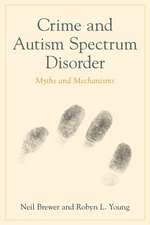Caught in the Web of the Criminal Justice System
Editat de Lawrence A. Dubin J. D., Emily Horowitz Ph D. Cuvânt înainte de Alan Gershelen Limba Engleză Paperback – 20 mai 2017
Preț: 354.98 lei
Preț vechi: 433.50 lei
-18% Nou
Puncte Express: 532
Preț estimativ în valută:
67.93€ • 73.77$ • 57.06£
67.93€ • 73.77$ • 57.06£
Carte disponibilă
Livrare economică 01-15 aprilie
Preluare comenzi: 021 569.72.76
Specificații
ISBN-13: 9781785927133
ISBN-10: 1785927132
Pagini: 320
Dimensiuni: 150 x 228 x 24 mm
Greutate: 0.48 kg
Editura: JESSICA KINGSLEY PUBLISHERS
ISBN-10: 1785927132
Pagini: 320
Dimensiuni: 150 x 228 x 24 mm
Greutate: 0.48 kg
Editura: JESSICA KINGSLEY PUBLISHERS
Textul de pe ultima copertă
Unjust sex offense laws result in draconian punishment and public shaming, and even those with autism and other developmental disabilities are caught in the web of our continually expanding sex offense legal regime. Investigating the public hysteria over sex offenses, this book highlights the ways our legal system has been infused with politics and panic, and fails to protect those with developmental disabilities who pose little threat to society, or lack a core understanding as to why their actions break the law. Proposing an informed and compassionate way forward based on research and evidence-based sentencing, experts from the fields of law, ethics, psychology and sociology explore what steps should be taken in order to ensure that even those charged with crimes that elicit emotional responses, such as sex offenses, receive justice.
Cuprins
Foreword by Alan Gershel, J.D., Former U.S. Attorney, Eastern District of Michigan, USA. Introduction. Mark Mahoney, J.D.. Introduction: Caught in the Web of the Criminal Justice System: Autism, Other Developmental Disabilities and Non-Contact Sex Offenses. Lawrence A. Dubin, Professor of Law, University of Detroit Mercy School of Law, USA and Emily Horowitz, Professor of Sociology and Criminal Justice, St. Francis College, Brooklyn, New York, USA. 1. A Father's Journey to Protect His Son: A Legal Perspective. Lawrence A. Dubin. 2. Child and Juvenile Pornography and ASD. Gary Mesibov, Licensed Psychologist, Professor Emeritus, University of North Carolina, USA. 3. Representing an Autism Spectrum Disorder Individual Charged with Possession of Internet Child Pornography: A Case Study. Kenneth M. Mogill, Criminal Defense Lawyer, Mogill, Posner & Cohen, USA. 4. Forensic Assessment of Individuals on the Autism Spectrum Charged with Child Pornography Violations. Dr Dennis P. Sugrue, Assistant Professor of Psychiatry, University of Michigan, USA. 5. Sex Offenses, Lies, and Politics: The Web of the Registry. Emily Horowitz. 6. Tilting at Windmills: The Misplaced War on Child Pornography Offenders. Mark H. Allenbaugh, Criminal Defense Lawyer, USA. 7. Egregious Flaws Discredit the Butner Redux Study: Effective Policies for Sentencing Federal Child Pornography Offenders Require Findings Based on Valid Research Principles. Richard Wollert, Mental Health, Law and Policy Institute, Simon Fraser University, Canada and Alexander Skelton, Department of Corrections, Wellington, New Zealand. 8. Accessors and Distributors of Child Pornography: Not Who You Think They Are. Fred S. Berlin, Sexual Behaviour and Consultations Unit, John Hopkins University, USA. 9. Collateral Damage of Sex Offender Management Policies for Individuals with Asperger's Syndrome and Their Family Members. Erin Comartin, Assistant Professor of Social Work, Wayne State University, USA. 10. An Alternative Universe: The Perspective of an Autistic Registrant. Nick Dubin, USA. 11. Navigating Judicial Responses for Those Caught in the Web. Catherine Carpenter, Professor of Law, Southwestern Law School, USA. 12. Asperger's Syndrome and Downloading Child Pornography: Why Criminal Punishment is Unjust and Ineffective. John Douard, Professor of Philosophy, University of New Jersey, USA and Pamela Schultz, Professor of Communication Studies, Department of Psychology and Communication, Alfred University, USA. Afterword. Tony Attwood.
Descriere
Arguing for reform in the judicial treatment of people convicted of sex offenses, this book examines how sentencing policies are based on emotion rather than research. Using the lens of harsh sex offense prosecutions of those with developmental disabilities, this book highlights the hysteria underlying our approach to sex offenses.
